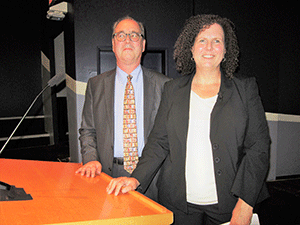
Lawyers can best gauge whether executive orders are running contrary to the rule of law in a democratic society if they “read and listen,” advised Anne Egeler, deputy solicitor general of Washington State, who was part of a Washington attorney general team that successfully challenged United States President Donald Trump’s executive order on immigration.
Egeler was speaking to the Law Society of British Columbia’s first Rule of Law lecture May 31 in Vancouver's downtown University of B.C. continuing education campus.
When events such as Trump’s immigration order followed his election, there was a lot of press and discussion. Egeler advised lawyers to glean as many diverse opinions as possible to “get the bigger picture” as well as speak with friends, family and members of the public.
“What are the people on the ground feeling?” she said, adding that when arguments are one-sided or divided, the rule of law is not accommodating “people on the ground.”
Egeler talked about another controversial U.S. Supreme Court decision, which upheld a presidential executive order during the Second World War following the bombing of Pearl Harbour and placed Japanese Americans into internment camps regardless of their citizenship. In 1988, then-president Ronald Reagan, acknowledging the error, issued an apology to those interned in camps.
“It is important for all of us to reflect upon that. This is on the forefront of what is happening with our nation today,” she said.
In the presidential election,Trump argued that terrorists were using the U.S. refugee resettlement program as a means of entering the U.S. and campaigned on a ban against Muslims. A week after assuming the presidency, he signed Executive Order 13769 banning Muslims from seven countries from entering the U.S.
Egeler said there was no evidence to back up Trump’s claim and the immediate order caught many in transit with no chance of due process. She said the legal team within the attorney general’s department worked throughout the weekend following the Friday signing of the order to obtain a temporary restraining order. It was issued nationwide Feb. 3 in Washington v. Trump and upheld on appeal by the U.S. Court of Appeals for the Ninth Circuit on Feb. 9.
Executive Order 13780 then replaced 13769, placing limits on travel from six countries and for all refugees that did not possess a visa or valid travel documents. The new order has been the subject of court battles for a restraining order and under a permanent injunction. The U.S. Department of Justice has indicated it will continue to fight for the executive order. Egeler said the states of Washington and Hawaii as well as other individual cases have indicated a willingness to fight the ban to the highest U.S. courts.
Egeler said that out of the ensuing court battles came a court ruling that gave insight into executive orders 13769 and 13780 where Title 8 of the United States Code discusses inadmissible aliens and gives the president the right to suspend entry if determined detrimental to the interests of the U.S. However, it is tempered by the Immigration and Nationality Act of 1965, which maintains that no person shall receive preference or priority or be discriminated against when a visa is issued because of race, sex, nationality, place of birth or place of residence.
The courts, she said, in halting the last order maintained they had the ability to affect orders that impacted the rule of law and the rights of individuals but that they did not have the power to prevent the president from issuing executive orders.
While unable to attend the lecture in person, Richard Gordon, who served as lead counsel for Wales in the R (Miller) v. Secretary of State for Exiting the European Union (Brexit) case, sent a video presentation discussing the role of the rule of law in the case. Gina Miller was the U.K. woman who mounted a legal challenge that resulted in a decision that only Parliament could make a decision that could remove the U.K. from the European Union since it had enacted legislation entering into the union. Removal was not a decision by the current government executive, despite a referendum.
Gordon's presentation looked at the balance of power that existed in government, parliament and the people and how the rule of law, which was designed to be universal, represented the interests of all individuals. In his presentation, Gordon returned to the eight principles underlying the rule of law as presented by Lord Tom Bingham in his book Rule of Law.
Both Egeler and Gordon's video presentations will be available on the LSBC website by mid-June, with Gordon's already on
YouTube.
The LSBC's Rule of Law committee hopes to make the lectures an annual event, said Craig Ferris, chairman of the committee. Moderator for the session was lawyer Jon Festinger.

 Lawyers can best gauge whether executive orders are running contrary to the rule of law in a democratic society if they “read and listen,” advised Anne Egeler, deputy solicitor general of Washington State, who was part of a Washington attorney general team that successfully challenged United States President Donald Trump’s executive order on immigration.
Lawyers can best gauge whether executive orders are running contrary to the rule of law in a democratic society if they “read and listen,” advised Anne Egeler, deputy solicitor general of Washington State, who was part of a Washington attorney general team that successfully challenged United States President Donald Trump’s executive order on immigration.